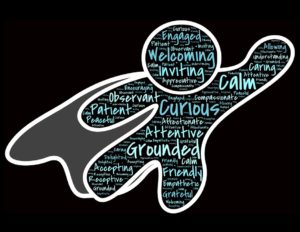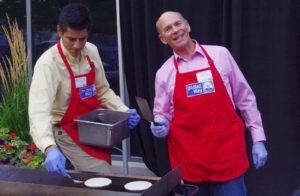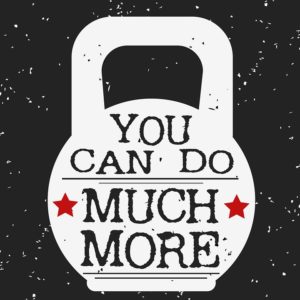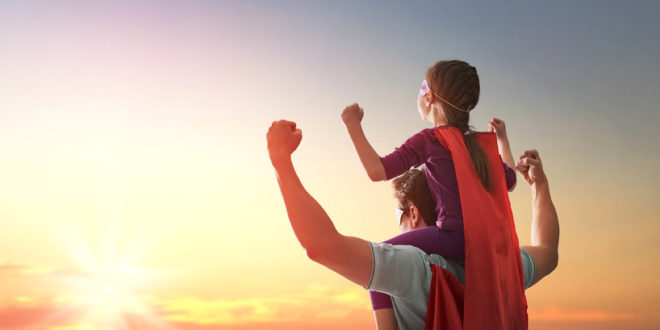by Michelle Sutton-Kerchner
Heroes often conjure images of bodybuilders dressed in a variety of service uniforms. Lifting weights and running the treadmill provides a hero’s physique. But, there’s more to heroism than being faster than a speeding bullet …
Be an Upstander
There is a plethora of talk lately on becoming an upstander. Standing up to bullies, both young and old, our own or those of others, is a trending topic. Our culture is striving to banish bystanders by bringing awareness to the value of standing up for what is correct. To become this kind of everyday hero, we need to assume our best physical and mental stature.

When we intervene because someone is being mistreated or misrepresented, or we carry a bag of groceries for an elderly shopper, we evoke our inner hero. Acts of compassion and empathy reflect heroism as much as the kitten-pulled-from-a-tree scenario. The well-being of others becomes our own as we act on behalf of those unable to “rescue” themselves.
What It Takes
Opportunity. Smarts. Strength. All of these are needed, but not in the sense you may think. Opportunities present themselves daily. You don’t need a burning building to set the stage for a heroic act.
A medical degree isn’t required to recognize someone is suffering from a broken heart or in need of a simple band-aide. When the body responds to a crisis with a rush of adrenaline, how much you can bench press will become irrelevant. (We’ve all heard stories of regular people gaining super-human strength during a rescue.)
Chances to sport heroism’s cape surround us. Use the confidence and strength gained during your fitness journey to intervene. Help others live their healthiest lives by lending a bicep or a motivational fist bump.
 Center members often tout the improved functionality their workout provides beyond the Fitness Floor. Pay it forward. Participate in a fundraiser walkathon/run. Rake leaves for a sick friend. Bring a meal to a grieving family. Be a hero, quietly, if only for one day, one meal, or one person.
Center members often tout the improved functionality their workout provides beyond the Fitness Floor. Pay it forward. Participate in a fundraiser walkathon/run. Rake leaves for a sick friend. Bring a meal to a grieving family. Be a hero, quietly, if only for one day, one meal, or one person.
Health Benefits of Heroism
The wellness you continuously seek improves by using your health for the benefit of others. Studies reveal acts of goodwill help the doer along with recipient. Everyday heroes tend to have improved self-esteem, lower depression risk, and better heart health.
Referred to as “helper’s high,” small acts of kindness, as well as more grandiose gestures, release endorphins. Helping actually can become a happy addiction as those involved enjoy the ensuing euphoria. (This is not to be confused with a “runner’s high,” which is helpful in its own right when heroically chasing down purse-snatchers.)

Those unofficially dedicated to helping others usually experience less pain and heal quicker. The endorphin release can be credited, as well as the powerful influence of being needed. Despite adding more tasks to their own often overbooked schedules, do-gooders gain positive energy from their actions. This helps reduce fatigue, stress, and hormones that cause inflammation and disease.
A Hero’s Workout

Do your warm-up, tackle cardio fitness, pump iron, stretch deeply. Keep your workout varied, to tackle all areas. You never know if you’ll be called upon to run the extra mile or lift the heaviest brick. Accomplish the mindful balance of yoga. Strengthen your core with Pilates to protect your skeletal structure. (Heroes cannot afford bad backs.)
Nurture the self-confidence needed to approach life knowing you can make a positive contribution. Exercise to be strong when and where it counts. Whether you need to carry the weight of one person or one solution to a great problem, be fit to be a hero.
Image Credits
Supportive hands: pixabay.com/en/hands-friendship-hold-holding-63743
Superhero: pixabay.com/en/superhero-human-being-power-alive-450419
Volunteers: pixabay.com/en/community-pancake-feed-breakfast-897760
Kettlebell: pixabay.com/en/fitness-motivation-healthy-1208141
 Fitness & Wellness News Your Source for Fitness News, Wellness News, Health News, and Nutrition News!
Fitness & Wellness News Your Source for Fitness News, Wellness News, Health News, and Nutrition News!




